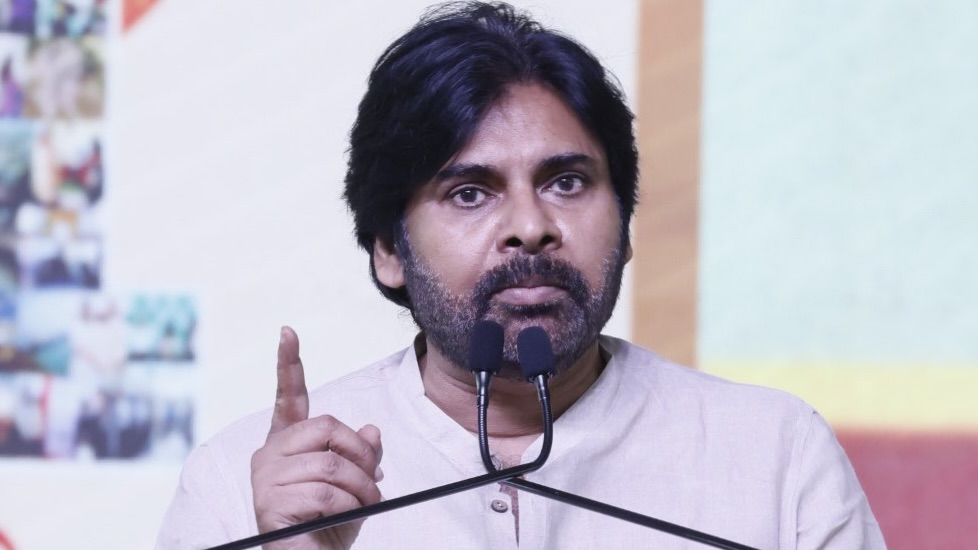While asserting that he does not intend to undermine the importance of regional languages, he stressed that Hindi, as Rashtra Basha, plays a crucial unifying role.
Published Jul 11, 2025 | 3:55 PM ⚊ Updated Jul 11, 2025 | 3:55 PM

Pawan Kalyan’s endorsement contradicts his own fierce opposition to Hindi just a few years ago.
Synopsis: Andhra Pradesh DyCM and Jana Sena Party chief Pawan Kalyan has publicly endorsed Hindi as the national language, likening it to a peddamma (maternal elder aunt) in relation to one’s mother tongue. This is a clear departure from his earlier strong opposition to the language. His remarks come even as resistance continues to grow in southern states.
Andhra Pradesh Deputy Chief Minister Pawan Kalyan has openly declared his support for Hindi as the Rashtra Basha (national language), describing it as akin to a peddamma (maternal aunt) in relation to one’s own mother tongue.
“If our native language is ‘amma’, Hindi is like ‘peddamma’. It is the only language that connects people across the diverse regions of the country. Learning Hindi should not be seen as surrendering our identity, but as keeping pace with others. If we can accept Urdu or Persian, why not Hindi?” the actor-turned-politician questioned, speaking at the golden jubilee celebrations of the Rajya Bhasha Vibhag of the Union Home Ministry at Gachibowli in Hyderabad, on Friday, 11 July.
While asserting that he does not intend to undermine the importance of regional languages, he stressed that Hindi, as Rashtra Basha, plays a crucial unifying role.
“Languages like Tamil, Telugu, Kannada and Odia are vibrant and living languages, and I deeply respect them. But Hindi is our Rashtra Basha. Ironically, many southern businessmen have no qualms in doing business with Hindi-speaking people in the North, and yet raise objections when it comes to recognising Hindi’s broader role,” he said.
He also drew a comparison with English, stating that learning Hindi is not about replacement but addition.
“Just as we gained immensely in IT and other sectors by learning English, adopting Hindi does not mean giving up our mother tongues. Once we move outside our respective states, Hindi becomes our language,” he asserted.
Pawan Kalyan’s endorsement comes at a time when there is growing resistance in South India against the perceived imposition of Hindi by the Centre.
Notably, it also contradicts his own fierce opposition to Hindi just a few years ago.
In a 2017 post on Twitter, Kalyan, then fiercely critical of the BJP, had written:
“North Indian political leadership should understand & respect the cultural diversity of our Country.”
North Indian political leadership should understand & respect the cultural diversity of our Country. pic.twitter.com/DFwIqyXXgk
— Pawan Kalyan (@PawanKalyan) April 23, 2017
His latest remarks are expected to trigger strong reactions, especially in states like Tamil Nadu and Karnataka, where linguistic identity is a deeply emotive and political issue.
In Tamil Nadu, for instance, the Dravida Munnetra Kazhagam (DMK) and other regional parties have consistently opposed attempts to impose Hindi.
They have long argued that promoting Hindi at the expense of Tamil, Telugu, Kannada, or Malayalam amounts to cultural and linguistic marginalisation.
Kalyan’s previous remarks on Hindi had already drawn criticism from certain quarters, particularly in Tamil Nadu. Critics on social media had branded him a “southern spoon” of the North Indian political establishment and accused him of pushing a pro-BJP agenda under the guise of cultural integration.
Now, with his formal recognition of Hindi as the national language, the debate has been reignited.
Though he heads the Jana Sena Party, Pawan Kalyan is often seen as ideologically aligned with the BJP, with which his party is in alliance.
His endorsement of Hindi is likely to be read in that context, and may further fuel suspicions among opposition parties in the South that the BJP is pushing a larger Hindi-centric national identity narrative in yet another different way.
(Edited by Dese Gowda)
